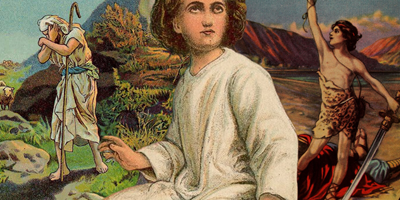Transcript:
Stephen: Hi, it's Stephen Mullan here again with Joel Hawthorne for another conversation about the Bible. We're opening the Bible and getting a closer look at the foundational truths that Christians have. What do we actually believe? What's the foundation of what we say we believe?
One of the things that Christians do believe is that God is good. So yes, God is the creator, yes God rules, yes God is a God to be feared, but He's also a good God. That changes everything in the concept of God that we have. Where do we get the idea of God being a good God?
Joel: I suppose that again comes from these early chapters, this first chapter of Genesis that we've been looking at. In verse 28 of Genesis chapter 1, we read this expression "and God blessed them."
I think there's this idea around—I think C.S. Lewis first spoke about the concept of God as a cosmic spoilsport. He's kind of looking down from heaven, seeing who's enjoying themselves and trying to put a stop to it. That is a total misrepresentation of the character of God. Nothing could be further from the truth. God's desire for all of humanity and all human beings is that they would be blessed.
But there are certain ways in which human beings will be blessed, and there are other ways in which we will not be blessed. So God does not just pronounce a blessing on everything that we do. Absolutely, there is a possibility that there are things that we want to do, but they're actually bad—they're actually terribly bad for us. And so God does not bless them.
God has put certain boundaries and restrictions in place. People look on that as a negative thing, that God is in some way impinging on their freedoms. But God does that to preserve us from ourselves. He knows what is good for us and what is not good for us.
You have small children, so you know how this works. I'm sure your children would love to eat ice cream or pizza for breakfast every morning. I'm sure that's a request that's often made, and I'm sure you usually say no to that. And it's not because you don't love your children, it's not because you don't want them to be happy, but you know if they live their life with that kind of reckless abandon, it's going to be disastrous for them.
So I'm just making the point that when someone is stopped from doing something, that doesn't mean that the person who is stopping them doesn't have their best at heart. We've got to have a degree of humility here and recognise what we are: we're dependent, contingent beings, and God knows better than we do.
Stephen: He sees the big picture. He sees the end in view, and we're often so caught up in right now and what my body wants right now. So that humility is really important. You'd probably find that in the Book of Proverbs, I'm thinking, where you have that idea of "you fear the Lord, it's the beginning of wisdom."
I think that sense of looking down the line—Proverbs is about looking down the line. You see, okay, that might be nice for now, but follow that track to the very end and now you see the destruction. Now you see how that ends up in a place where you didn't get what it was promising. But in fact, God's way—it might right now actually not feel very blessed, but at the end of the day, you'll look back and say that was the way.
Joel: So if we're going to experience God's goodness, we need to understand how that comes to us. God has revealed Himself to us, particularly through His Word, the Bible, and His Son, Jesus Christ. If we're going to enjoy God's goodness, we will have to interact with those things.
Whenever a car is made, someone buys a new car, they often get along with that the owner's manual. It's called the owner's manual, but it's really the designer manual. It's from the person who has made it, because they've built it for a certain purpose and it works in a certain way. So then when a person who understands a lot less about the creation comes to use it, they can defer to the authority of someone who understands much better than them, and they can use this thing in its fullest and most rich way.
The same should apply to our lives. We have to defer to the wisdom and to the understanding of God, to recognise that He has unlimited knowledge and we don't. We have to go, if you like, to the designer's manual and see how God would have us live a good life.
Stephen: That's great.
---
Follow Joel and Stephen's series of conversations on YouTube





























